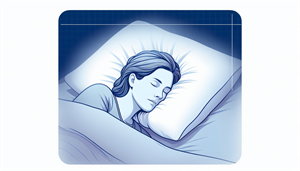Ever been told that your snoring could wake up the entire neighborhood? You’re not alone. In fact, what percentage of people snore? With a whopping 45% of adults snoring occasionally and 25% doing so regularly, snoring is more common than you’d think. But beyond being a nighttime nuisance, snoring can significantly affect sleep quality and overall health.
Key Takeaways
-
Around 70% of adults snore, with 45% experiencing occasional snoring and 25% being regular snorers.
-
Snoring is caused by a partial obstruction in the airway. Risk factors include age, gender & weight gain.
-
Left untreated, it can lead to serious health risks such as heart strain or depression, seek professional help if needed!
Snoring Prevalence: A Closer Look

The symphony of snores that fills countless bedrooms every night is not just a mere annoyance. It’s a sign that your body is struggling to get the oxygen it needs during sleep. Snoring, characterized by that all too familiar, grating sound, occurs when the airway is partially obstructed, causing the relaxed muscles in your throat to vibrate. But how common is this sleep disturbance? Data shows that nearly half of all adults snore occasionally, while a quarter snore on a regular basis.
Snoring isn’t something that should be brushed under the rug. If not addressed, it can lead to serious health problems like:
-
obesity
-
diabetes
-
heart disease
-
severe obstructive sleep apnea
Therefore, if you or your partner belong to the 45% who snore occasionally or the 25% who snore regularly, it’s time to investigate what might be disturbing your peaceful sleep.
Occasional Snorers
We all know that person who only seems to snore when they’ve caught a cold, or after they’ve had one too many at the pub. This is what we call occasional snoring, and it’s experienced by nearly 45% of adults. Factors like nasal congestion from allergies or colds, and even the consumption of alcohol, can all contribute to this sporadic symphony of snores.
But don’t be fooled. Even occasional snoring can have a significant impact on your sleep quality. It can leave you feeling tired during the day, affect your ability to concentrate, and even increase your risk of high blood pressure and heart problems. In some cases, it might even be indicative of a sleep disorder, such as sleep apnea.
Regular Snorers
Then, there are those who snore with an unwavering consistency, night after night. These habitual snorers, accounting for about 25% of the population, may be experiencing sleep disorders like obstructive sleep apnea. If left unaddressed, these issues can have a significant impact on overall health and well-being.
These regular snorers are often found in the age group of 30 to 60 years old and are at a higher risk of developing health issues such as high blood pressure, heart disease, and stroke. Interestingly, being overweight can exacerbate regular snoring. The extra soft tissue in your mouth and throat, along with fat around your neck, can block your airway when you’re lying down, leading to louder and more frequent snores.
The Science Behind Snoring

So, what exactly happens when you snore? Imagine this: you’re deeply asleep, and the muscles in the roof of your mouth, tongue, and throat begin to relax. This relaxation leads to a partial obstruction in your airway. As you breathe, the reduced space for air to flow causes the tissues in the throat to vibrate, creating the sound we know as snoring.
The narrower the airway, the louder the snore. This happens because when the airway is constricted, the air flows more forcefully. This increased force causes the tissues in the throat to vibrate more intensely, resulting in louder and more frequent snores. But fear not, various methods like positional therapy, using a CPAP machine, or getting a custom mouthpiece can help alleviate this nocturnal nuisance.
Risk Factors for Snoring
You might ask, “Why do some people snore while others sleep without a sound?” The reasons are as diverse as the range of snoring sounds. Some common factors that can contribute to snoring include:
-
Weight gain
-
Age
-
Gender
-
Nasal congestion
-
Certain medications
These factors can all play a part in whether you snore or not.
Factors that can contribute to snoring include:
-
Gaining weight, as the extra fat in your neck can squish your airway when you lie down
-
Aging, as muscle tone decreases and changes occur in the airway
-
Being male, as men are generally more prone to snoring than women
-
Having a stuffy nose from a cold or allergies
-
Taking certain medications that relax throat muscles, leading to a narrowed airway and increased snoring.
Snoring and Sleep Apnea: What's the Connection?
Although occasional snoring can be harmless, chronic, loud snoring might indicate a more serious problem – obstructive sleep apnea (OSA). During sleep, this condition happens when the throat muscles relax excessively, leading to a blockage in the airway. This can result in breathing difficulties and disrupted sleep. This can lead to brief interruptions in breathing, which increase the risk of cardiovascular disease.
Snoring is often louder in people with OSA. These individuals snore more loudly and may even experience shallow breaths or gasping for air during sleep. If left untreated, OSA can cause serious health problems like high blood pressure, heart diseases, stroke, and even metabolic syndrome and diabetes.
Strategies for Reducing Snoring
While snoring can be a nuisance, the good news is that it can be managed. From lifestyle changes to positional therapy and sleep medicine, there are several strategies at your disposal to help you reduce snoring and improve sleep quality.
Whether you’re an occasional snorer aiming for a quiet night’s sleep for your partner, or a habitual snorer striving to enhance your overall health, these strategies can assist you in tackling your snoring issues. By understanding what causes snoring and taking appropriate measures to control it, you can enjoy a quieter, more restful night’s sleep.
Lifestyle Modifications

Several straightforward lifestyle changes can significantly reduce snoring. Losing weight, for instance, can help by reducing fat in the throat and neck, easing pressure on the airways. Regular exercise, particularly targeted facial and throat exercises, can strengthen muscles in the area, reducing their likelihood of causing an obstruction.
Cutting back on alcohol can also be beneficial. Alcohol causes the muscles of the jaw and throat to relax excessively, which can lead to snoring. By limiting alcohol consumption, particularly close to bedtime, you can help to alleviate snoring.
Positional Therapy

Have you observed how some people snore loudly while sleeping on their back, but not when they turn to their side? This is where positional therapy proves useful. By encouraging side sleeping, positional therapy can help to keep the airway open, reducing snoring.
Positional therapy involves using special devices or tactics, like a positional therapy belt or certain types of pillows, to promote side sleeping. These devices help to open up the airway, reduce vibrations, and consequently lessen snoring, leading to a more restful night’s sleep.
Medical Interventions
If lifestyle modifications and positional therapy are insufficient to diagnose sleep apnea, medical treatments may be required. One such intervention is the use of a CPAP (Continuous Positive Airway Pressure) device. This device keeps the airway open during sleep by delivering a constant flow of air through a mask, effectively reducing snoring.
Another medical solution is the use of customized mouthpieces, such as mandibular advancement devices (MADs) or tongue-retaining devices (TRDs). These devices work by pushing the lower jaw forward or holding the tongue in place, preventing it from falling back into the airway and obstructing the soft palate. This helps to maintain an open airway, reducing the vibrations that cause snoring.
The Impact of Snoring on Sleep Quality and Health
Snoring can do more than merely disturb a tranquil night’s sleep. It can considerably affect sleep quality and overall health. Frequent snoring can lead to:
-
fragmented, low-quality sleep
-
daytime fatigue
-
irritability
-
difficulty concentrating
The effects of snoring extend beyond sleep, potentially leading to serious health problems. Some of the potential health risks associated with snoring include:
-
Strain on the heart, increasing the risk of high blood pressure, heart attack, and stroke
-
Weight gain
-
Increased risk of conditions like diabetes or depression
It is important to address and treat snoring, seeking appropriate treatment to minimize these health risks.
When to Seek Professional Help
Recognizing when to seek professional assistance for snoring is important. If snoring persists despite your best efforts, or if it is accompanied by symptoms like excessive daytime sleepiness, morning headaches, or a dry mouth upon waking, it’s time to consult a healthcare provider.
Untreated snoring can lead to serious complications like sleep apnea, decreased oxygen levels in the blood, and cognitive issues. Therefore, if your snoring is causing distress or affecting your daily life, don’t hesitate to seek the advice of a healthcare professional.
Summary
Snoring is more than just a nighttime annoyance. It’s a widespread issue that can significantly impact sleep quality and overall health. From occasional snorers to regular symphony conductors, understanding the causes and implications of snoring is crucial. It’s important to explore various strategies, from lifestyle modifications to medical interventions, to manage snoring effectively. Above all, remember to seek professional help if snoring persists or worsens. Here’s to quieter nights and more restful sleep!
Frequently Asked Questions
Is it normal for everyone to snore?
It's normal for around 45 percent of adults to snore occasionally, and 25 percent to snore regularly. Being overweight, an older adult, or a postmenopausal woman can increase the chances of snoring, which tends to worsen with age.
What age group snores the most?
Snoring is most common in older adults, with 40% of adult men and 24% of adult women snoring regularly. Seniors are particularly prone to snoring, making them the age group that snores the most.
Do thin people snore?
Thin people can snore too, though weight gain and alcohol or sedatives may make it more likely. Cutting down or avoiding such things, as well as not sleeping on your back, could potentially help.
Is snoring rare?
Snoring is quite common, with many people snoring occasionally. However, it can be more serious for those who experience chronic or loud snoring, which can increase health risks.
What percentage of the population snore?
45 percent of adults snore occasionally, while 25 percent snore regularly, making it quite common. Factors like being overweight or being a middle-aged or older man or postmenopausal woman can increase your chances of snoring.


